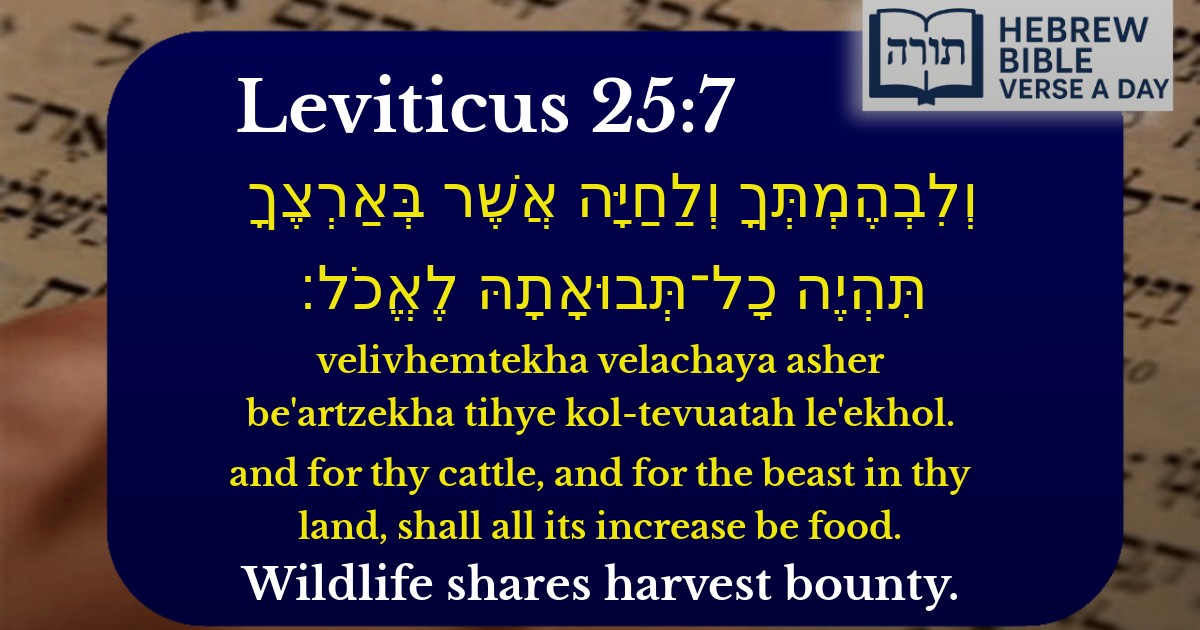Frequently Asked Questions
Q: What does Leviticus 25:7 mean?
A: Leviticus 25:7 teaches that during the Sabbatical year (Shemitah), the produce that grows on its own in the land of Israel is not owned by any individual. Instead, it must be available for everyone—including your animals and the wild animals—to eat freely. This emphasizes the idea that the land belongs to Hashem, and during Shemitah, we acknowledge His ownership by letting the land rest and sharing its bounty equally.
Q: Why is Leviticus 25:7 important in Judaism?
A: This verse is important because it highlights the mitzvah (commandment) of Shemitah, which is a test of faith in Hashem. By not working the land and allowing all to eat from its produce, we demonstrate trust that Hashem will provide. The Rambam (Hilchot Shemitah 4:1) explains that this law strengthens our belief in Divine providence and reinforces social equality by ensuring food for all, including animals.
Q: What can we learn from Leviticus 25:7 today?
A: We learn the values of trust in Hashem, humility, and generosity. Even today, when Shemitah is observed in Israel, farmers refrain from working the land, and produce is treated as ownerless (hefker). This reminds us that material possessions are temporary, and true sustenance comes from Hashem. Additionally, it teaches compassion for all creatures, as even wild animals are included in this provision.
Q: How does Leviticus 25:7 apply to modern farming in Israel?
A: In modern times, Orthodox Jewish farmers in Israel observe Shemitah by letting their fields lie fallow or using special halachic (Jewish legal) arrangements like heter mechirah (a temporary sale of land to a non-Jew, under rabbinic supervision). The verse’s principle—that the land’s produce is for all—is upheld by making Shemitah produce available to everyone in accordance with halachah.
Q: Does Leviticus 25:7 mean we can’t store food during Shemitah?
A: No, the verse does not forbid storing food, but it does require that the produce of the land be treated as ownerless (hefker). The Talmud (Avodah Zarah 62a) and Rashi explain that while you may gather food for immediate needs, hoarding Shemitah produce for personal profit is prohibited. The focus is on sharing and ensuring equal access for all, including animals.


Context in the Torah
This verse (Leviticus 25:7) appears in the context of the laws of Shmita (the Sabbatical year), where the land of Israel is to lie fallow every seventh year. The verse specifies that during this year, the produce that grows on its own is not to be harvested for human consumption in the usual manner but is designated as free for animals—both domesticated (behemtecha) and wild (chayah).
Rashi's Explanation
Rashi (Rabbi Shlomo Yitzchaki) comments that the phrase "תִּהְיֶה כָל־תְּבוּאָתָהּ לֶאֱכֹל" ("shall all its increase be food") teaches that the produce of the Shmita year is not to be treated as private property but is hefker (ownerless), available to all creatures equally. He emphasizes that even though humans may eat from it (as permitted in other verses), the primary designation is for animals, reinforcing the idea that the land's produce during Shmita is not for human profit or commerce.
Rambam's Perspective
In Hilchot Shemita v'Yovel (4:1), the Rambam (Maimonides) rules that the produce of the Shmita year is permitted for consumption by both humans and animals, but it must be treated with sanctity (kedushat shevi'it). He derives from this verse that one may not hoard the produce for personal gain or deny access to animals, as the Torah explicitly equates their rights to it during this year.
Midrashic Insight
The Torat Kohanim (Sifra, Behar 1:7) links this verse to the broader ethical theme of tza'ar ba'alei chayim (avoiding unnecessary suffering to animals). It teaches that just as humans rely on the land's bounty, so too must we ensure that animals—both domesticated and wild—are provided for, especially in a year when the land is at rest. This reflects the interconnectedness of all creation under Hashem's providence.
Halachic Implications
Philosophical Dimension
The Kli Yakar (Rabbi Shlomo Ephraim Luntschitz) notes that this verse underscores humility: during Shmita, humans are reminded that they do not truly "own" the land—it belongs to Hashem. By sharing the produce with animals, we acknowledge our place within a larger divine order, fostering compassion and detachment from materialism.